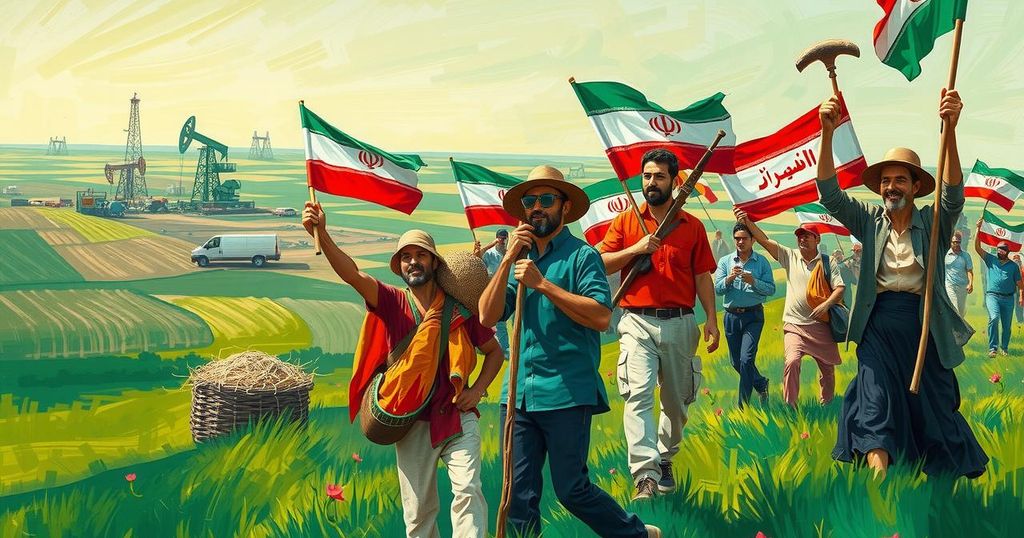Protests in Iran are intensifying across various groups, including farmers in Isfahan demanding water rights, oil workers seeking fair wages in Lavan, and families of political prisoners fighting against executions in Tehran. These movements reflect a wide-ranging discontent with the regime’s corruption and mismanagement. Significant incidents, such as armed attacks in Iranshahr, further illustrate the rising tensions within the country.
Protests in Iran are escalating as various societal groups demand justice and their rights. Farmers from Isfahan, oil workers in Lavan, and families of political prisoners in Tehran are actively voicing discontent against the regime’s mismanagement and repression, indicating widespread grievances across the country.
On March 28, Isfahan farmers rallied to assert their water rights and advocate for the reopening of the Zayandeh River. This water crisis is a result of governmental mismanagement and diversion projects favoring military interests, affecting thousands of farmers’ livelihoods. Despite recent releases of water from the dam, skepticism remains about the regime’s commitment to resolve these issues.
The ongoing protests by Isfahan farmers highlight Iran’s broader water scarcity issues exacerbated by the Islamic Revolutionary Guard Corps (IRGC) prioritizing industrial expansion over agricultural needs. One protestor emphasized, “We only want water, yet they steal it and tell us not to protest. How can we stay silent?”
In Lavan, workers from the Iranian Offshore Oil Company resumed protests on March 26, seeking fair wages and improved job conditions. In Shush, Haft-Tappeh Sugarcane Company workers echoed these sentiments, demonstrating against job insecurity, which reflects growing dissatisfaction among Iran’s labor force amid economic instability and inflation.
On March 25, families of political prisoners continuously gathered in Tehran as part of the “No to Executions Tuesdays” campaign, demanding an end to death sentences for their incarcerated loved ones. There is significant outrage over the cases of Vahid Bani-Amerian and Pouya Ghobadi, highlighting the regime’s harsh punitive measures.
The protests continue amidst rising tensions; on March 27 in Iranshahr, armed attackers targeted a police patrol, resulting in one death and two injuries, yet state media played down the incident. This points to ongoing conflicts between security forces and local resistance groups in affected areas.
As protests proliferate, the Iranian regime faces increasing opposition from various societal sectors. Farmers advocating for water, workers calling for fair wages, and families protesting executions collectively express a profound dissatisfaction with systemic corruption and repression. With pressure building both within Iran and from the international community, these protest movements appear poised to persist in the foreseeable future.
The protests occurring in Iran signify a growing unrest among various societal factions, including farmers, workers, and families of political prisoners. The common demands for water rights, fair wages, and an end to executions highlight widespread discontent with governmental mismanagement and repression. As pressure mounts, the resilience of these movements suggests that unrest may continue to grow in the upcoming months.
Original Source: www.ncr-iran.org






